Blog

10 steps to get a kick-ass Russian accent
- 27.09.2018
- vlad.pruha.web
- 1
Want to command respect as if you were a badass Russian villain in a Hollywood film? Reckon you can do a better job than Harrison Ford’s questionable attempt at a Russian accent? Russia Beyond has you covered.More
A Russian accent is often imitated by English-speakers but rarely perfected. You’ll probably be familiar with the mean-sounding tone usually heard in Hollywood Russian accents, but do you know which sounds Russian speakers most commonly carry through to their spoken English? Follow these tricks, and you’ll be sounding like a native in no time!
10 TIPS FOR LEARNING A FOREIGN LANGUAGE
- 27.09.2018
- vlad.pruha.web
- 1
When I arrived in Buenos Aires in the beginning of 2010, I could barely order food in a local restaurant. Two years later, I calmly explained the mechanics of Russian grammar to a Guatemalan friend… in her native Spanish.More
How Many Vocabulary Words You Need to Know to be Fluent in English?
- 27.09.2018
- vlad.pruha.web
- 1
English learners may come from different countries in different regions of the world, but all of them have one common question: “How many vocabulary words do you need to know to be fluent in English?” At first, you may think that that fluency will come to you after learning over 1,000,000 (1 million) words — that’s a very big and admirable goal, but large numbers like that can be quite demotivating, so is there a set number of words you need to know in order to become fluent in English?More
Which English Program is Best for You?
- 27.09.2018
- vlad.pruha.web
- 1
There are more than 1,000 intensive English programs in the United States. How can you choose the program that is best for you? Begin by thinking about these things: your reason for English study, program types, length of time for study, program quality, program services, location, housing, and cost.More
Extensive vs Intensive Reading
- 27.09.2018
- vlad.pruha.web
- 1
In a previous blog post, we touched briefly on the distinction between extensive and intensive reading as learning strategies. The first of the two claims that the biggest improvements can be seen when a language learner reads as much as possible, regardless of content. Intensive reading, on the other hand, puts the focus on working with a short text but really getting to know the ins and outs of the text, in order to fully understand how language works.More
10 Useful Tips to Teach Yourself English
- 27.09.2018
- vlad.pruha.web
- 2
Do you love learning English, but don’t have enough time?More
Or do want to learn more English, but not your formal English class?
If so, we’ve got some good news.
You don’t have to have formal English lessons to improve and fine-tune (perfect) your English skills.
What is the use of watching movies in English?
- 27.09.2018
- vlad.pruha.web
- 1
I needed time to think and duly the delay. I finally got around, assuming these three pointers stand in good stead:More
You like watching English movies.
You want to improve your speaking skills.
You want to know how movies helped fellow Quorans improve theirs.
What is Business English?
- 27.09.2018
- vlad.pruha.web
- 1
Having thought about this question for a while, I have arrived to a number of aspects which I think constitute the meaning of Business English for me. I am saying “for me” because it really may mean different things to different people. Therefore, my personal point of view is very subjective and is as follows.More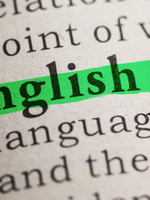
Top five motivations for learning English
- 27.09.2018
- vlad.pruha.web
- 1
Whatever you’re trying to achieve, staying motivated is the key to success. Learning English can be tough, so it’s useful to focus on the improvements learning English will make to your life. We asked 6,000 people in twelve countries about the reasons why they’re learning...More
10 mistakes made by learners of English
- 27.09.2018
- vlad.pruha.web
- 1
Do learners of English make particular mistakes in grammar, pronunciation, and vocabulary depending on their mother tongue? (While linguists distinguish between an error, made by a student who doesn’t yet know the correct rule, and a mistake, made by a student who knows the rule but momentarily forgets it, I’ll use mistake to cover both cases.)More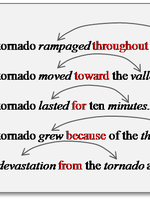
Adjective Prepositional Phrases
- 06.09.2018
- vlad.pruha.web
- 1
Definition: An adjective prepositional phrase describes a noun or pronoun. It answers the questions which one, what kind, how much, or how many.More
Adjective: The wind's sound made a whistling noise.
Prepositional Phrase: The sound \of the wind made a whistling noise.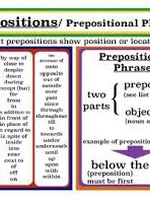
Prepositions and Prepositional Phrases
- 06.09.2018
- vlad.pruha.web
- 1
Definition: A preposition is a word that shows the relationship between a word in the sentence and the word that is the object of the prepositionMore
.
You have just finished the Modifiers Module. You learned that adjectives tell which one, what kind, how much, and how many about a noun or pronoun. You learned that adverbs tell where, when, how, and to what extent about verbs, adjectives, and adverbs.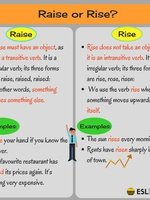
Challenging Verbs: Rise/Raise
- 06.09.2018
- vlad.pruha.web
- 1
Rise: to rise (yourself).More
I rise from my bed when I am no longer tired.
Raise: to raise something else.
I always raise my hand in class.
Present Present
Participle Past Past Participle
Rise (self) rise rising rose risen
hallenging Verbs: Lie/Lay
- 06.09.2018
- vlad.pruha.web
- 1
Lie: to lie (yourself) down.More
I lie down on my bed when I am tired.
Lay: to lay something else down.
I lay down my backpack in the hallway when I get home.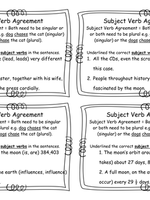
Challenges in Verb Agreement
- 06.09.2018
- vlad.pruha.web
- 1
Challenge 1: Compound SubjectsMore
If the subjects are joined by and, you always use a plural verb. (Hint: one and one are always two.)
Mystery and fantasy are my two favorite genres.
My mother and my father are both home from work.
The exception to this is when and joins two nouns, but they are considered a single object.